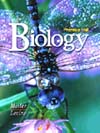Biology News from millerandlevine.com
NOTE: Ken Miller and Joe Levine have written two new "virtual" textbook pages on prions and mad cow disease. Click Here for copies these pages, which are intended for classroom use.

Click to Return to the Home Page of the Dragonfly Book
Teacher Resources
Looking for teaching ideas on CJD (mad cow)? Here are several lesson plans recommended by the American Association for the Advancement of Science (AAAS) through their Science NetLinks Program:
Diseases without Borders - studying the spread of disease across geographical boundaries. ("Students will use the European Union's struggle with Mad Cow Disease as a starting point to study the spread of infectious diseases across geographical boundaries.")
Invisible Invaders - Studying the effects of epidemics on different aspects of society ("In this lesson, students research various epidemics that have devastated the world population at different points in history, focusing on the historical events taking place during the times of the epidemics")
"Mad Cow" Disease appears in the United States
"Mad Cow" Disease is the common name for Bovine Spongiform Encephalopathy (BSE), a disease of cattle that first was noticed in the United Kingdom in 1986. Cows with BSE behaved strangely - they staggered and drooled, sometimes acted agressively, and at other times were unable to stand. When the cattle were examined after slaughter, their brains were shot full of holes — filled with empty spaces where cells seemed to have died from a mysterious disorder. At first, the government in Britain assured the public that this strange disease posed no threat form humans. But in 1996, medical authorities admitted that at least 10 people who had died from a similar human disorder (Creutzfeldt-Jakob Disease, or CJD) had probably contracted CJD by eating meat products from BSE-infected cows.
Since 1996, Britain and many other countries have adopted strict inspection rules to keep infected meat products from the human food supply. Many authorities hoped that similar rules in the United States would keep BSE from appearing here, but in December 2003, a confirmed case of BSE was found in tissues of a cow that had recently been slaughtered:
Many aspects of BSE and CJD are still very poorly understood. But scientific opinion on the disease generally accepts the hypothesis put forward by Nobel Laureate Stanley Puisiner, an American biologist who has argued that these diseases are caused by protein infections particles called "Prions." (Click Here to visit the web page of Dr. Prusiner's laboratory)
The Prion Hypothesis suggests that diseases like mad cow and human CJD are caused by the misfolding of a protein known as PrP that most cells contain. Once a few copies of the protein become misfolded (the form shown in the right-hand image), they cause other PrPs to misfold, leading to an accumulation of insoluble proteins in the cell. By mechanisms that are not understood, these misfolder proteins cause cell death and damage the nervous system.
More Information about Mad Cow:
National Cattlemen's Beef Association Information on BSE
BSE Resources and Articles from New Scientist: http://www.newscientist.com/hottopics/bse/
The CDC's mad cow page: http://www.cdc.gov/ncidod/diseases/cjd/cjd.htm
Mad Cow information from the World Health Organization
http://www.who.int/emc/diseases/bse/
NOVA Mad Cow program: http://www.pbs.org/wgbh/nova/madcow/
"When Science Faces the Unknown" by Joe Levine: http://www.pbs.org/wgbh/nova/madcow/faces.html
20-20 Hindsight (Joe Levine): http://www.pbs.org/wgbh/nova/madcow/hindsight.html

